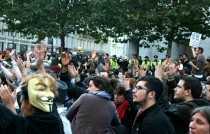GA WG Minutes – Wednesday 25th January 2012
Event: GA Working Group – (Issue Resolution and Process Improvement)
Location: Salvation Army Cafe
Date: 25th January 2012
Starts: 2.30pm
Present: Ben, Simon, Akila, Ruth, John
John: Let’s collect issues.
Ben: Get back to having GA forward planning meetings. Better communication. Better sight on what isn’t covered. Better understanding about what the process is.
Akila: Safer spaces policy. How to deal with people who break safer spaces.
Ruth: After any eviction: what would GAs be for, how often would we want them, when would the first one be, where would they be, how would we let people know about them, and what would the first subjects be.
Simon: Where GAs are appropriate and where they are not. Look at other communication technology that might be more suitable. In conflict situations, after trauma, and in polarised situations it might be better to do something other than have a GA.
Akila: Ask people what the GA means to them. Be clear about what the GA is for. How should WGs be feeding into the process. Where do proposals come from?
Ruth: In climate camp, “process” wasn’t just GA planning. It was responsible for communication. If you joined you would be committed, take away tasks and do them. Didn’t work as well as it could do. Press group has taken on role but haven’t been accountable. We have WGA on Tuesday and process where WGs feed proposals into
Look at what GA is for: decision making, shaping up what Occupy London is about (more decision making), getting together and exchanging information, imaging the future. Some games like that would be useful.
Akila: You need a strong group of people, or a group or people, having a group of people that can frame whatever is happening in the group.
John: GA/WG relations: What: Be considerate of the way things make others feel. How: WGs bring aims for consensus to the GA. Start off by refreshing remits.
Ben: If people think a WG has gone rogue, then somebody can come to process group and ask for group to be recalled.
Simon: WGA is a good place to verify what WGs are doing. [reveals WGs who don’t show up although not much time for questions]
Ben: Some groups don’t stick to what has been agreed. What doesn’t work well is going to the WG. Also doesn’t work talking to.
John: We could have Working Group Questions, either time at WGA or tabled questions.
Simon: Got to go, but we need more time to talk. We are starting it here.
Ruth: Yes that would be good. Having a council would bring all its own problems. Need a way to add and remove people.
Propose that WGA have discussion sessions. And structure in presumption that if WGs don’t attend then they are [something].
[Simon leaves]
Ruth: Could do homelessness as first GA.
John: Agree, but let’s leave actual subjects to planning meetings. There are issues of how to organise: what’s it called (People or General Assembly); where does the PA come from; who does livestream.
Ruth: [about implementing Safer Spaces] At each GA ask how has Safer Spaces worked this week. Don’t set out to resolve issues, but make a note of what they are.
John: Let’s review the issues…
1. Forward planning isn’t happening very well.
2. Not sure which meeting are attended/when to show up.
3. Not sure whether there is a shared understanding the process.
4. Safer spaces policy isn’t implemented very well.
5. What/how/why/when/etc of GA happen post eviction.
6. Don’t have enough ways of keeping aggravation out of the GA.
7. Purpose of GA isn’t clear enough.
8. Working groups aren’t cohering with each other (people are getting upset about total independence).
9. Don’t have a way to recall rogue working groups.
10. Facilitators get burnout.
11. There is not debrief and review after GA.
12. Spokes model from OWS.
Ben: We need to have a way of stopping people speaking out of turn. Perhaps barring somebody from speaking for the rest of the meeting.
Akila: There is too much pressure on facilitator. Role needs spreading out. Perhaps have two facilitators, and swap between them. People attack the facilitator.
John: Let’s look at 5. (Ruth’s questions).
Ben: We could just do the same thing, not change anything.
What would GAs be for?
• Decision making
• Determining statements
• Decisions about actions
• Practical issues of occupying ground (“camping issues”)
• Exchange of information
• Holding each other to account
• Getting to know each other
• Entry point for movement
How would they operate?
• Make a decision by consensus about a proposal
• Breakout into groups for focussed discussion
• Remain together as assembly for focussed discussion
How often would we want them?
• Same schedule?
• Other assembly?
When would the first one be?
• Would we want one next day after a night time eviction?
• Leave it for a few days?
• Leave it for no longer than 24hrs?
Where would they be?
• Steps of St Paul’s.
∘ in case of rain: go to top of stairs; ad hoc shelter
Wow would we let people know about them?
• Use normal channels (mailing list).
• Use twitter and facebook more.
• Get names of homeless people, let them know
• Get list of all places people are going to
• Find out if people are going to in a shelter or sleeping on the streets, and ask if we can get back in touch
What would the first subjects be?
• “What happened?” Large component of self-expression.
• “What next?”
• “Homelessness”
• Current works in progress: “Aims”, “Banking”, “Corporations”, “Democracy”, “Environment”, etc.
What it would be called?
• Occupy London on Wed and Fri?
• Occupy LSX on Fri and Sun?
• Start to use name People’s Assembly?
Ends: 4.50pm




